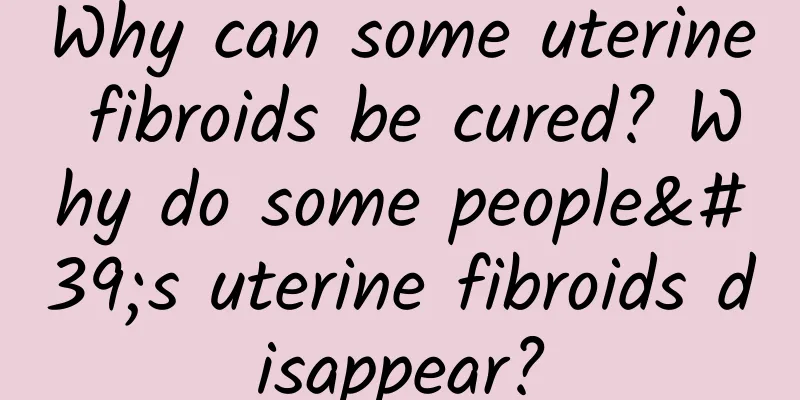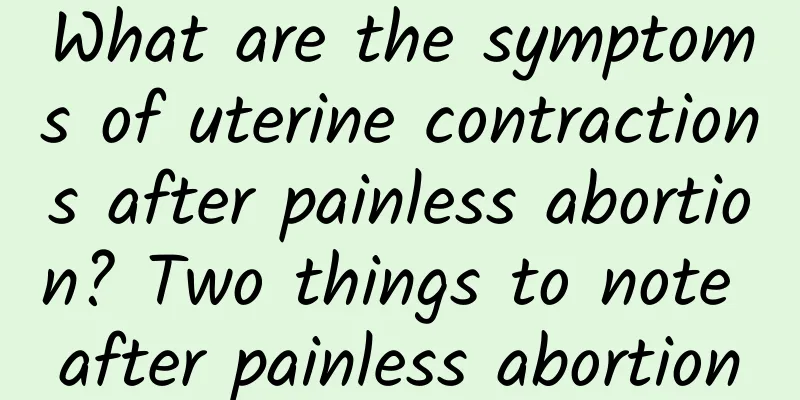Why can some uterine fibroids be cured? Why do some people's uterine fibroids disappear?

|
Why can some uterine fibroids be cured? Why do some people's uterine fibroids disappear? Uterine fibroids are a common gynecological disease in women, with a high incidence rate. However, unlike other diseases, some uterine fibroids can be cured, while some people's uterine fibroids will miraculously disappear. Why does this happen? This article will explain this issue from different perspectives. First of all, the cure of uterine fibroids is related to its type and size. Uterine fibroids are divided into different types, including serous, fibroid and mixed. Among them, the most common is fibroid uterine fibroids. This type of uterine fibroids is benign in most cases and does not have the risk of cancer. For small fibroid uterine fibroids, some doctors will recommend observation because they tend to shrink or disappear on their own around menopause. Secondly, individual differences are also one of the reasons for healing or disappearance. Everyone's physical condition and immune system are unique, so the response to uterine fibroids is also different. Some people's immune systems are better able to fight the growth of fibroids and eventually cure them. Others may have a weak immune system or other health problems that prevent the uterine fibroids from being eliminated. Therefore, if you find that you have uterine fibroids, it is very important to seek medical advice as soon as possible and develop a treatment plan based on your individual situation. In addition, lifestyle and eating habits may also affect the development and treatment efficacy of uterine fibroids. Some studies have shown that factors such as high-salt diet, heavy drinking, and lack of exercise are related to the occurrence and expansion of uterine fibroids. Therefore, improving diet structure, controlling salt intake, and exercising moderately may help prevent and treat uterine fibroids and promote the shrinkage or even disappearance of fibroids. Finally, scientists have conducted some research on the reasons why uterine fibroids disappear, and found that changes in hormone levels may be one of the reasons behind it. The levels of estrogen and progesterone in women change periodically, and these hormones play an important role in the growth of uterine fibroids. When hormone levels change, it may inhibit the growth of fibroids, causing them to disappear. This is also the reason why many uterine fibroids disappear on their own around menopause. In short, why some uterine fibroids can be cured, while others disappear, is due to the combined effect of multiple factors. Including the type and size of the lesion, individual differences, living and eating habits, and changes in hormone levels. However, regardless of the outcome of uterine fibroids, early medical treatment and professional treatment are the key to preventing and treating uterine fibroids. Only by taking active measures and fully communicating and consulting with doctors can we better master the treatment methods of uterine fibroids and increase the probability of cure and disappearance. |
Recommend
To prevent pelvic inflammatory disease, you need to take certain measures
In recent years, the incidence of pelvic inflamma...
Antioxidant power competition! Top 5 must-eat fruits and vegetables in autumn and winter to help you stay away from diseases!
"Ha-chiu!" The weather changes dramatic...
Are endometrial polyps also called uterine fibroids?
Are endometrial polyps also called uterine fibroi...
Common treatment misunderstandings of vaginitis
What are the common misunderstandings in the trea...
5 major weight loss traps for seniors: Don’t lose weight and get fatter
I eat very little, so why am I getting fatter and...
5-color crystal rice dumplings add phytochemicals, kidney patients eat less burden
On the eve of the Dragon Boat Festival, every hou...
Is hyperprolactinemia serious?
Hyperprolactinemia is a relatively serious gyneco...
How to treat chronic cervicitis in women? 4 major methods of rehabilitation treatment of chronic cervicitis in women
After people find that they have chronic cervicit...
Which one has higher calories, the southern or northern zongzi? "This landmine" is easy to ignore! Nutritionist Huang Weijie: 3 tips for eating zongzi without gaining weight
The index finger is as big as a "zongzi"...
What to do if a pregnant woman has pelvic effusion
Pelvic effusion is some inflammatory exudate in t...
Can you drink brown sugar ginger tea after abortion? Pay attention to 3 things in your diet after abortion
Many couples do not take necessary contraceptive ...
What are the hazards of cervicitis in women? Women must be alert to the five major hazards
Women who suffer from cervicitis may experience s...
What causes severe cervical erosion and how to treat it?
What causes severe cervical erosion and how to tr...
What should women with uterine effusion pay attention to?
Uterine effusion is a manifestation rather than a...
How to deal with the recurrence of vulvar itching in women
How to effectively prevent the recurrence of vulv...









